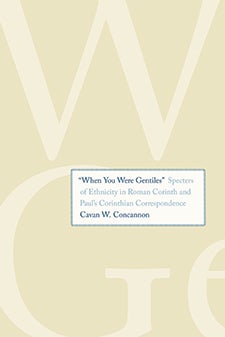Rethinking Early Christianity
Cavan Concannon likens contributing to the massive scholarship on Paul the Apostle to finding a spot on a New York City subway at rush hour.
“All you can do is elbow your way in,” said the assistant professor of religion at USC Dornsife. “Your reward is being able to stand in a really uncomfortable position for half an hour.”
But Concannon has found a fascinating point of entry. His new book, “When You Were Gentiles”: Specters of Ethnicity in Roman Corinth and Paul’s Corinthian Correspondence (Yale University Press, 2014) expands and re-imagines the exchange between Paul and the people of ancient Corinth with whom the apostle conversed, debated and allied.
Not among the first followers of Jesus of Nazareth, Paul traveled as a missionary around the first-century eastern Mediterranean world in the decades following the death of Christ. Over half of the books in the Christian New Testament claim to be letters from Paul, though many of these are disputed by modern scholars.
In a broader sense, Concannon’s book contributes to an emerging consensus about the concept of religion; namely, that it is a thoroughly modern social and analytical category.
“Most people throughout history didn’t think about religion the way we do now,” he said. “They didn’t have that category for organizing the things that we call ‘religious’ into a compartment. So the book asks, are there other ways we can organize and think about what we call early Christianity outside of the category of religion?”
More than religion, the idea of ethnicity and peoplehood was a familiar social category in the ancient world, especially in the multiethnic Roman Empire. The book explores how early Christianity and the beliefs, practices and ideas people associate with religion might be instead considered as marking ethnicity. Looking at ancient community boundaries helps modern scholars see how the notions of ethnicity are analogous to modern ideas of what it means to be religious.

Researching for his book, Cavan Concannon excavated at Corinth, Greece, and studied in the country for a year.
The book title is a reference to a quote from Paul in 1 Corinthians 12:2: “You know that when you were Gentiles, you were carried away before these dumb idols, and led astray.”
“This offhand comment is interesting, and understudied, in the way that it presumes that those to whom Paul is writing ‘used to be’ gentiles, meaning that they have changed their ethnic designation by virtue of joining Paul’s movement,” Concannon said. “It’s another way of noting the ways in which a category like ethnicity might be a better way to describe early Christian communities.”
Derived from Jacques Derrida’s Specters of Marx, the book’s subtitle is a reference to its goal of conjuring the voices and arguments of those other than Paul’s — people he debated with within the Corinthian community. Since they have disappeared from the historical record, Concannon imagines these voices as ghost voices.
“So much of my field is focused on what Paul said and meant,” Concannon said. “But he’s always talking to a motley crew of people who have their own opinions and viewpoints, and who are pushing back in their own ways. By paying attention to Paul’s rhetoric, I found ways to imagine alternate voices that speak to, against and around Paul, and I tried to uncover the disappeared, forgotten voices that are part of how these early Christian communities shaped their lives.”
The book examines the people of Corinth — a maritime city with considerable trading and people moving in and out — through the lens of ethnicity and traces the ways that ethnicity finds its way into both Paul’s rhetoric and daily life in the city. Depending on his audience, Paul would identify as a Jew, Roman or gentile. “I have become all things to all people, that by all means I might save some,” he writes in 1 Corinthians 9:22.
To write the book, Concannon drew on ancient Latin and Greek literary sources, as well as inscriptions, architecture and pottery from the modern excavations of the city of Corinth, near modern-day Athens, Greece. He excavated at Corinth and lived in Greece for a year. He also analyzed material culture artifacts such as pottery and architecture to place alongside the literary analyses of Paul.
“Pottery gives you a window on the kinds of trade connections a city has and how a place like Corinth is connected with other parts of the ancient world,” he said. “I also looked at buildings and architecture — the way a building is constructed and how it tries to present itself can tell us a lot about daily life in Corinth, the interests of the city as a whole and the experience of its people.”